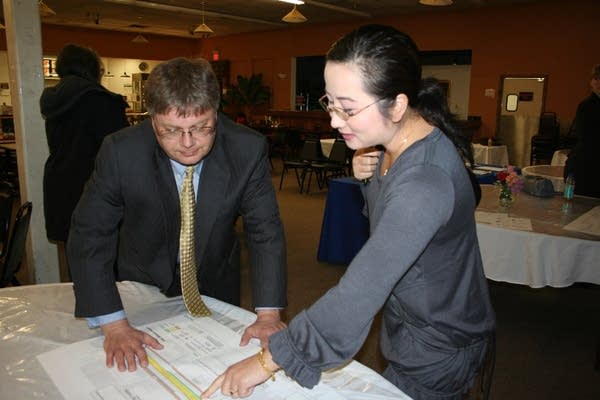Central Corridor parking makes businesses nervous
Go Deeper.
Create an account or log in to save stories.
Like this?
Thanks for liking this story! We have added it to a list of your favorite stories.

Parking isn't the most riveting subject, but it's all that Mai Thao Khang thinks about when it comes to light rail.
"I worry about parking, or the time they fix the street, nobody will shop in my store," Khang said.
Khang owns two groceries and a laundromat along University Avenue. From the back row of the meeting, she told Metropolitan Council representatives that she would fiercely oppose one of the solutions being bandied about: parking meters.
"What she said in Hmong, which wasn't translated, was that, if there were metered parking, she'd literally rip the meter out," said ThaoMee Xiong with the Hmong Business Association. The group represents many of the mom-and-pop storefronts along the avenue.
Turn Up Your Support
MPR News helps you turn down the noise and build shared understanding. Turn up your support for this public resource and keep trusted journalism accessible to all.
"I think that goes to the extent of her fear of losing business. If it's not convenient for your patrons, they're obviously going to go elsewhere," ThaoMee Xiong said.
The stakes are especially high on the eastern part of the corridor, a once seedy stretch that the Hmong and other immigrants have helped turn around.
"The rent was low, and taxes were low. And now everything is being increased," said Xiong. "So, how are we going to help these small businesses that helped revive University, so they can actually stay here, versus having big companies like Target and Wal-Mart and Walgreen's come here and take over?"

Business leaders and community members said they were surprised by the latest parking numbers released by the Met Council. The council estimates that up to 85 percent of University Avenue's on-street parking spaces could vanish if everyone got what they wanted from the project.
"It was shocking," said Anne White, who represents a collaborative of district councils closely watching the project.
"It means you could end up with less than 200 parking spaces for the whole length of the avenue," said White.
Original plans called for taking out street parking only at essential spots, such as left-turn lanes and station intersections.
But through public meetings, the Met Council heard a demand for pedestrian crossings, even in places where there is no traffic signal. Central Corridor spokeswoman Laura Baenen said those extra features would result in cutting an additional 360 parking spaces.
"We thought it would be fair to go back to the public, and say, 'OK, you said you really wanted a lot of pedestrian access. That would mean even more on-street parking loss. Is this still what you want?" Baenen asked.
Project planners aren't looking to build parking ramps, but they are studying a number of possible solutions. For example, meters would lead to more turnover of parking spaces. Otherwise, business owners would worry that downtown commuters might drive to University Avenue, leave their cars for the day and take the train to work.
Another idea is to ask businesses to share their off-street surface parking lots. But Nou Thor, who owns a medical clinic on University, said she doesn't have any asphalt to spare. She hovered over a map of the plan with the Met Council's traffic engineer, Dan Soler.
"When I accommodate my patients, I don't want shared parking space, because if they share it, where will my patients park?" Nou Thor asked.
"Absolutely, I agree," said Soler. "This is not an opportunity for shared parking."
Soler told her the idea behind the meeting wasn't to strong-arm business owners to share their parking. But he is encouraging businesses to think creatively.
The Met Council board is expected to sign off this summer on a more detailed plan for the route, which would affect the avenue's parking supply. Lawmakers are trying to find a way to restore state funding for the project, after Gov. Tim Pawlenty vetoed $70 million in the bonding bill.
The Met Council said there's still time for business owners and residents to make their case now for the changes, block by block. But they need to speak up now.




